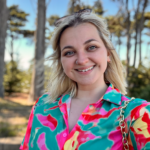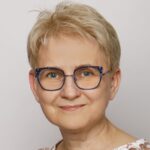About the professionals (in alphabetic order by first name):
Angelica Bernabe is a person who stutters from Peru and is the director of the Specialized Center for Stuttering (Centro Especializado en Tartamudez). She is a speech and language pathologist and a PhD student at Florida State University. Angelica is dedicated to working with people who stutter and training professionals, having presented to clinicians from 30 countries. She facilitates monthly support groups for Spanish-speaking parents through FRIENDS, an American organization for young people who stutter. Angelica won the World Stuttering & Cluttering Organization Clinician Award in 2022 for her work helping the Hispanic community.
Heather Najman, MS/MA, LMFT, TTP®, SEP has been a part of the stuttering community for over 30 years in various roles such as a NSA/ISA/NCOS presenter, NSA Chapter Co-Leader, Stutter Social co-host, and guest lecturer to university SLP students. As a psychotherapist and trainer, she consults and works online with individuals and families with a focus on TransformingTouch®, resilience and regulation, stress, shame, and trauma, in addition to the emotional effects of stuttering.
 Hilda Sønsterud (PhD) is a speech-language therapist (SLT) and a clinical researcher in Norway. She works as a Senior Advisor at Statped, National Service for special needs education, and as an Associate Professor at Nord university, Faculty of Education and Arts. Hilda works primarily with treatment and research related to stuttering and cluttering. Hilda is ESS-certified (European Stuttering Specialist) and is an active lecturer. She runs courses and workshops within the field of stuttering and cluttering, and she provides clinical practice and supervision for SLT students and SLTs. Her PhD-project “Stuttering therapy; What works for whom?” at the Department of Psychology, University of Oslo, was grounded in practice-based evidence and in context-sensitive collaboration with people who stutter. Hilda has investigated the therapeutic alliance within stuttering therapy, and she is particularly engaged by how clinical research within the stuttering and cluttering field is defining evidence. Hilda is a national representative in the International Cluttering Association (ICA).
Hilda Sønsterud (PhD) is a speech-language therapist (SLT) and a clinical researcher in Norway. She works as a Senior Advisor at Statped, National Service for special needs education, and as an Associate Professor at Nord university, Faculty of Education and Arts. Hilda works primarily with treatment and research related to stuttering and cluttering. Hilda is ESS-certified (European Stuttering Specialist) and is an active lecturer. She runs courses and workshops within the field of stuttering and cluttering, and she provides clinical practice and supervision for SLT students and SLTs. Her PhD-project “Stuttering therapy; What works for whom?” at the Department of Psychology, University of Oslo, was grounded in practice-based evidence and in context-sensitive collaboration with people who stutter. Hilda has investigated the therapeutic alliance within stuttering therapy, and she is particularly engaged by how clinical research within the stuttering and cluttering field is defining evidence. Hilda is a national representative in the International Cluttering Association (ICA).
Katarzyna Węsierska is an associate professor at the University of Silesia in Katowice, Poland, and the co-founder and president of the Logopedic Centre Foundation. She focuses mainly on stuttering and cluttering in her research and clinical practice. She is a European Fluency Specialist, coach, and lecturer of the European Stuttering Specialization (www.ecsf.eu). She has been actively involved in numerous research projects conducted in the framework of the International Project on Attitudes Toward Human Attributes – IPATHA. Dr. Węsierska is the secretary of the International Cluttering Association (ICA) and the editor of the ICA newsletter. At the 11th Oxford Dysfluency Conference, she was awarded the David Rowley Award for International Initiatives in Stuttering.
 Manon Spruit has been a Speech and Language Pathologist since 1995. Since 2000 she owns a private practice, specialized in fluency disorders in Germany. She is a lecturer at different Universities of Applied Sciences in several countries, gives workshops and courses on Cluttering, Stuttering and their differences and commonalities.
Manon Spruit has been a Speech and Language Pathologist since 1995. Since 2000 she owns a private practice, specialized in fluency disorders in Germany. She is a lecturer at different Universities of Applied Sciences in several countries, gives workshops and courses on Cluttering, Stuttering and their differences and commonalities.
Nic Maddy is a speech and language therapist working withing the NHS in the UK for over 20 years. She’s also on the committee for the National Stammering Clinical Excellence Network. She’s passionate about creating a world that makes space for, and embraces stammering. She loves to work collaboratively with people who stammer to make moves towards this within her local area.
 Nicole Kulmaczewski is a speech therapist in the Hudson Valley, NY. She co-founded Myspeech, a non-profit that aims to connect people who stutter to speech therapists in the United States as well as access to resources. Nicole is passionate about advocacy and spreading stuttering awareness through social media posts, continuing education, and day to day life.
Nicole Kulmaczewski is a speech therapist in the Hudson Valley, NY. She co-founded Myspeech, a non-profit that aims to connect people who stutter to speech therapists in the United States as well as access to resources. Nicole is passionate about advocacy and spreading stuttering awareness through social media posts, continuing education, and day to day life.
![]()





My name is Retz. My question is this….Here in the USA, ASHA does not require any course work or clinical practicums in the area of stuttering in order to obtain the Certificate of Clinical Competence, and yet the vast majority of the CCC’d school based SLP’s – who have no education or training re: stuttering offer/deliver “therapy” for children who stutter. Isn’t this unethical? If a CWS stuttering becomes more severe after “treatment”, would it be grounds for a lawsuit against a school district and therapist? What ever happened to “DO NO HARM”? Thanks for the response ahead of time…
Hi Retz,
Thank you very much for your thoughtful and vital question. I share your concerns; they are valid and highlight the need for better standardized training requirements in stuttering therapy globally, not just in the U.S. but also globally. The situation you describe regarding the need for more specific requirements in stuttering therapy is concerning, especially considering the potential consequences of unqualified or inadequately trained professionals working with children who stutter. However, this is not a rare issue and similar challenges can be found across various regions. Speaking from a European perspective, the landscape of speech-language pathology (SLP) education is highly varied, and many organizations across countries serve as equivalents to ASHA, each with different regulations and training standards. As both a clinician and an academic involved in training speech-language therapists in various institutions, there is a clear recognition among our professionals of the importance of continuous learning, particularly in specialized areas such as stuttering. For instance, many SLTs in countries like Poland take it upon themselves to enhance their skills, often paying for additional training out of their pockets and participating in workshops or courses on weekends or during their time off.
That being said, we also need more unified regulations ensuring a high standard of education in stuttering therapy. This means that the therapeutic approaches available can vary widely, and in some cases, no specialized therapy may be available. Actions like the ISAD online conference can be crucial in raising awareness and helping clinicians and the general public understand what stuttering therapy should entail.
“Do not harm” is a fundamental principle of our profession, and if a child’s stuttering were to worsen due to inadequate therapy, this could raise ethical concerns. Thank you again for your question. I hope that platforms like this conference can serve as a stepping stone toward improving the quality of care for individuals who stutter.
Please follow the instructions on the page https://isad.live/isad-2024/talk-to-a-professional/ and create a new post for additional questions, thank you.